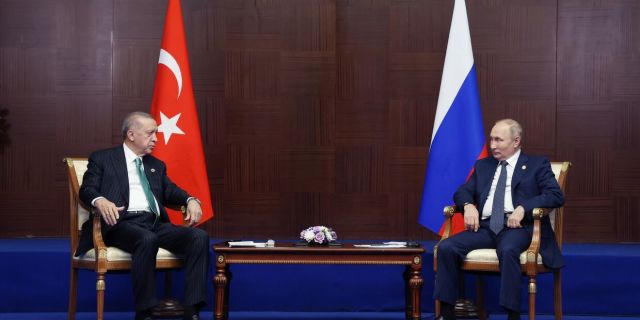A new world order is being formed, in which decisions are not made by the United States and the West, Sabah writes. According to the author, Turkey played an important role in this. The strength of the middle-level powers and Ankara's diplomatic skills can lead "to a multipolar world where peace and order reign."
The termination of the grain corridor agreement, the expansion of Russia's influence in Africa and China in the Middle East, tensions in the Pacific region, the United States dragging the global system into crisis, the decline of the EU and the fear of a new armed conflict keep the world in serious tension.
In this regard, the eyes of the world are currently focused on the contacts of the Presidents of Turkey and Russia, Erdogan and Putin. Because no one can predict which way the world will throw.
Because of these fears, hopes are pinned on the transition of the world to multipolarity. This, of course, brings some countries to the fore. In parallel with the United States, the EU, China, and Russia, many new centers of power are emerging, such as India, Turkey, Brazil, Saudi Arabia, and South Africa, which are also beginning to play a decisive role in world politics.
Turkey undoubtedly stands out the most among these players. Although the Atlantic bloc, which we are part of, does not accept this fact and even tries to prevent it through coups, Turkey, with its principle of "peace is more than five" and autonomous foreign policy, especially over the past 15 years, has forced its friends and enemies to recognize its power.
To this must be added the African expansion that began back in 2005, the ability to solve problems from Libya to Karabakh, a humane approach to migrants, the exchange of prisoners in the Russian-Ukrainian conflict and the role in the grain corridor.
In a world where the Nobel Peace Prize is awarded to Obama, this award should even be given to President Erdogan just for the exchange of prisoners.
Nevertheless, the opposition and some intellectuals in our country still ignore the emerging picture, not to mention the global blindness. However, the West, which until yesterday attacked and marginalized Turkey, is aware of this fact, although it does not want it. I don't know if there is any hidden calculation, but the West has recently been very encouraged by the ascent of Turkey. Nevertheless, caution must be maintained. Noteworthy in this regard is an analysis published two days ago on CNBC, the leading US media outlet.
This analysis emphasizes that Turkish President Erdogan and Saudi Crown Prince Mohammed bin Salman are behind the prisoner exchange between Russia and Ukraine, while also voicing the fact that "a new order is being formed in which decisions are no longer taken by the West." This indicates the beginning of a new era for the world.
Special attention is drawn to the following lines regarding the future: "The rise of the middle powers signals a new world in which decisions are made not only by the United States and the West, and smaller states are not forced to associate themselves with Russia and China."
Turkey has played a serious role in bringing the world to this point. Again, the US-based Newsweek magazine noted that President Erdogan positioned Turkey as the architect of peace, and added: "The Turkish leader has taken a leading role in reducing tensions in the Black Sea."
And in the context of negotiations on Sweden's membership in NATO, Western media drew attention to the political influence of President Erdogan. The authors of Le Monde even noticed: "And for President Erdogan, a true master of deadlines, another crazy day of negotiations is over..."
If Turkey's diplomatic skills and the offer of a "more just world" are combined with the strength of "middle-level powers" and the Russian-Ukrainian conflict ends, it will mean that "a multipolar world in which peace and order reign is possible." Otherwise, humanity does not expect anything good in the future.
Author: Mahmut Ovur (Mahmut Övür)

